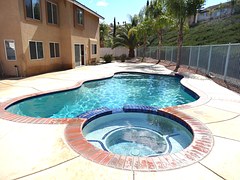Swimming Pool Injury and Drowning Cases in TN

Swimming pool injury cases are serious.
One of the most heartbreaking cases I have ever handled involved the accidental drowning death of a teenage boy. The parents of the young drowning victim grappled with death of their son at what started out as a fun swimming party with friends. The owner of the pool and the other party guests felt enormous grief, but at the same time, they did not know what they could have done differently. While the case was eventually settled, everyone involved was devastated, and the effects of the young man’s death were far-reaching. I will never forget the emotions of all of the parties and witnesses involved in that case.
Most people have no idea just how dangerous a swimming pool can be. Drowning and other swimming pool injuries happen quickly and quietly. Look at these statistics from the CDC:
Drowning Statistics
- Every day, about 10 people die from drowning.
- About 1 in 5 of those are kids 14 and under.
- Nearly 80% of drowning victims are male.
- Children ages 1-4 have the highest drowning rates. Among children ages 1-4, most drownings occur in home swimming pools.
- The drowning rate for African Americans is significantly higher across all ages. The disparity is widest among children ages 5-14.
 Pool Drains Can Be Deadly
Pool Drains Can Be Deadly
Drowning isn’t the only swimming pool safety concern. Pool drains can also cause significant injuries and death. In fact, there is federal legislation governing public pool drains because of the serious risk of harm and death. The legislation is known as the Virginia Graeme Baker Pool & Spa Safety Act and it is named after a young girl who drowned after she was trapped under water by suction from a hot tub drain. The suction from the drain was so strong that her mother tried to pull her from the drain but could not. The two men who eventually freed the girl pulled so hard that the drain cover broke from the force. The little girl died from drowning, but the real cause of her death was suction entrapment due to a faulty drain cover.
What to Do After a Swimming Pool Injury or Drowning
If you or a loved one has been injured in a swimming pool or hot tub, you may be entitled to compensation for your damages. Here are some pointers about what to do:
- Take photos of the scene. Include the pool, equipment, fencing, gates, toys, surrounding area, etc. It is extremely important to document the scene of the injury or death before the pool owners make any changes.
- Write down names, phone numbers, and addresses of any witnesses. If you decide to pursue a claim, your attorney will need to be able to contact and interview witnesses.
- Talk with a Swimming Pool Injury Lawyer. An experienced lawyer can examine the facts of a case and advise you of your legal rights and options.
Legal Info on Drowning and Pool Injury Lawsuits
In Tennessee, swimming pool owners have a duty to exercise reasonable care for the safety of persons using or accessing a swimming pool, hot tub, or spa. If a swimming pool owner is negligent, or fails to act with reasonable care, and a person drowns or is injured as a result, the pool owner will be liable for damages.
Every case is unique. Outcomes and liability assessments depend on the specific facts involved. A swimming pool injury lawyer will be able to talk with you about the circumstances under which the injury or drowning occurred and can give you the appropriate legal advice. Some of the factors that will influence the outcome of a Swimming Pool Injury or drowning case are:
- Age of the victim
- Swimming experience of the victim
- How the victim entered the property
- How the victim entered the pool
- Time frames
- Fencing around the property and/or pool
- Condition of the pool water, i.e., was it murky or cloudy?
- Gates and access mechanisms for entry to backyard or pool area
- Characteristics of property, i.e., visibility from public areas, presence of toys.
- Safety equipment available
- Type of supervision provided
- Involvement of alcohol
- Type of pool drain and other maintenance equipment
- Whether the pool was public or privately owned
- Training of lifeguards and other staff
- Notice to pool owners of dangers, access problems, or prior trespassing
- Local ordinances and codes that apply to swimming pools

Examples of Tennessee Court Cases on Drowning
Case outcomes are dependent on the facts and the proof or lack thereof that is presented in Court by the trial lawyers for the parties. Below are just a couple of examples of Tennessee drowning cases, either one of which might have turned out another way had the facts been slightly different:
Harper v. Elliott (1999). Four year-old boy wandered onto the pool owners’ property and drowned in their pool. The owners had a 46 inch high wrought iron fence with vertical bars surrounding the pool and access was through 2 gates with simple latches. The pool had a diving board and a slide and there were colorful inflatable toys in and around the pool. The subject street was a busy four lane and the child lived a few doors down. He had left his home while his father was away on a job interview and his mother was asleep. There was no evidence of the route the child took, or how he entered the pool area. A police officer speculated that he squeezed between the bars of the fence, took off his clothes, and slid down the slide into the pool. There was no evidence of what the child could have seen from public spaces. The judge said that it was too much to say that the pool owners knew or should have known that children were likely to trespass on their property. In all the years since they built the pool, they had never known of a child coming onto their property uninvited. Also, the street at issue was a busy, four-lane street, making it highly improbable that a child small enough to fail to appreciate the danger of a swimming pool would be wandering alone in the neighborhood. The judge granted summary judgment in favor of the pool owners and the jury never heard the case. Harper v. Elliott, No. 01-A-01-9809-CV00503, 1999 WL 499737, at *1 (Tenn. Ct. App. July 16, 1999).
Toney v. Cunningham (1999). A 19 month-old baby girl drowned while attending a Memorial Day celebration. The child’s grandmother agreed to watch her while the mother worked and took her over to the home of the defendants for a party. The grandmother took the child to one of the bedrooms in the home for a nap and then went outside to watch some other guests play tennis. On 2-3 occasions, the grandmother checked on the child, each time finding that she was asleep. During the tennis match, a ball was hit over the fence. A party guest attempted to retrieve the ball and saw the child floating face down in the swimming pool. The child’s mother filed a wrongful death suit against the pool owners. The court granted summary judgment to the pool owners because it did not think that, under the facts of the case, that the particular injury experienced by the baby was foreseeable to the pool owners. This was because at the time of the accident, the baby was under the supervision of her grandmother. Additionally, the pool owners and several guests were on or near the tennis court when the accident occurred. From the tennis court, the swimming pool is easily visible. It was unlikely that the baby would open the back door, walk to the swimming pool, and fall in without being seen or heard. Also, the pool owners knew that the baby was in the care of her grandmother and had every right to believe and expect that the grandmother would supervise the child. Balancing the factors, the court granted summary judgment in favor of the owners, meaning the case was never heard by a jury. Toney v. Cunningham, No. 02A01-9801-CV-00005, 1999 WL 188291, at *5-6 (Tenn. Ct. App. Apr. 6, 1999).
We Handle Swimming Pool Injury and Drowning Lawsuits
We represent pool injury victims and the families of those who have lost loved ones due to accidental drowning. If you need a Swimming Pool Injury Lawyer or an Accidental Drowning Lawyer in the Memphis or Nashville area, please call us at 901-372-5003 or email us here. Our work is personal. Our clients become family. Either I or one of our other experienced attorneys will meet with you and provide a free consultation. We will examine the facts of your case and advise you on your legal rights and options.
By: Erin Melton Shea
8001 Centerview Parkway, Suite 103
Memphis, Tennessee 38018
(901) 372-5003 Office
(901) 383-6599 Fax



 How do you achieve asset protection? How do you best limit your liability and protect the assets and investments you have spent so much of your life building up? While you cannot completely eliminate exposure to potential liability, you can achieve asset protection through the use of simple techniques, like buying the right kind of insurance, or through the use of more sophisticated tools like asset protection trusts.
How do you achieve asset protection? How do you best limit your liability and protect the assets and investments you have spent so much of your life building up? While you cannot completely eliminate exposure to potential liability, you can achieve asset protection through the use of simple techniques, like buying the right kind of insurance, or through the use of more sophisticated tools like asset protection trusts.




 “Can we sue them for defamation?” That is a question we receive very frequently from both Plaintiffs and Defendants we are representing in pending litigation. Typically, the question is a reaction to reading or hearing something alleged in the lawsuit, whether in a complaint, answer, discovery responses, or during courtroom or deposition testimony. The client asking that question usually feels that his or her integrity is being questioned, is very upset, and wants to know if he or she can “counter-sue.” In the context of litigation, the answer is no. Let’s explore why.
“Can we sue them for defamation?” That is a question we receive very frequently from both Plaintiffs and Defendants we are representing in pending litigation. Typically, the question is a reaction to reading or hearing something alleged in the lawsuit, whether in a complaint, answer, discovery responses, or during courtroom or deposition testimony. The client asking that question usually feels that his or her integrity is being questioned, is very upset, and wants to know if he or she can “counter-sue.” In the context of litigation, the answer is no. Let’s explore why.

 In some cases, a handwritten Will can be considered valid and admitted to Probate Court. Under Tennessee law, a handwritten Will is called a “Holographic Will.” It is not necessary that the document be witnessed, but all the material provisions and the signature must be in the Testator’s handwriting.
In some cases, a handwritten Will can be considered valid and admitted to Probate Court. Under Tennessee law, a handwritten Will is called a “Holographic Will.” It is not necessary that the document be witnessed, but all the material provisions and the signature must be in the Testator’s handwriting.